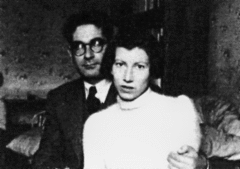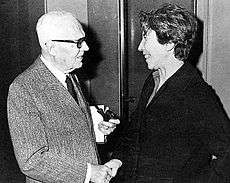Natalia Ginzburg
| Natalia Ginzburg | |
|---|---|
|
Natalia Ginzburg and President Sandro Pertini, c. early 1980s | |
| Born |
Natalia Levi July 14, 1916 Palermo, Italy |
| Died |
October 7, 1991 (aged 75) Rome, Italy |
| Pen name | Alessandra Tornimparte |
| Occupation | writer |
| Language | Italian |
| Nationality | Italian |
| Alma mater | University of Turin |
| Genres | novels, short stories, essays |
| Notable works |
Family sayings |
| Notable awards |
|
| Spouses |
|
| Children |
|
| Relatives | Giuseppe Levi (father) |
| The Honourable Natalia Levi Ginzburg | |
|---|---|
| Deputy of the Italian Republic | |
| Personal details | |
| Political party |
Italian Communist Party Independent |
Natalia Ginzburg, née Levi (Italian: [nataˈliːa ˈɡintsburɡ]; German: [ˈɡɪntsbʊɐ̯k]; 14 July 1916 – 7 October 1991), was an Italian author whose work explored family relationships, politics during and after the Fascist years and World War II, and philosophy. She wrote novels, short stories and essays, for which she received the Strega Prize and Bagutta Prize. Most of her works were also translated into English and published in the United Kingdom and United States.
An activist, for a time in the 1930s she belonged to the Italian Communist Party. In 1983 she was elected to Parliament from Rome as an Independent.
Early life and education
Born in Palermo, Sicily in 1916, Ginzburg spent most of her youth in Turin with her family, as her father in 1919 took a position with the University of Turin. Her father, Giuseppe Levi, a renowned Italian histologist, was born into a Jewish Italian family, and her mother, Lidia Tanzi, was Catholic.[1][2] Her parents were secular and raised Natalia, her sister Paola (who would marry Adriano Olivetti) and her three brothers as atheists.[3] Their home was a center of cultural life, as her parents invited intellectuals, activists and industrialists. At age 17 in 1933, Ginzburg published her first story, I bambini, in the magazine Solaria.
Marriage and family

In 1938, she married Leone Ginzburg, and they had three children together, Carlo, Andrea, and Alessandra.[4] Their son Carlo Ginzburg became a historian.
Although Natalia Ginzburg was able to live relatively free of harassment during World War II, because of Leone's anti-Fascist activities, her husband was sent into internal exile, assigned from 1941–1943 to a poor village in Abruzzo. She and their children lived most of the time with him.[5]
Opponents of the Fascist regime, she and her husband secretly went to Rome and edited an anti-Fascist newspaper, until Leone Ginzburg was arrested. He died in 1944 after suffering severe torture, including crucifixion, in jail.[5]
In 1950, Ginzburg married again, to Gabriele Baldini, a scholar of English literature. They lived in Rome. He died in 1969.
Career
After her marriage, she used the name Natalia Ginzburg (occasionally spelled "Ginzberg") on most subsequent publications. Her first novel was published under the pseudonym Alessandra Tornimparte in 1942, during Fascist Italy's most anti-Semitic period, when Jews were banned from publishing.
Ginzburg spent much of the 1940s working for the publisher Einaudi in Turin in addition to her creative writing. They published some of the leading figures of postwar Italy, including Carlo Levi, Primo Levi, Cesare Pavese and Italo Calvino. Ginzburg's second novel was published in 1947.
The experiences that she and her husband had during the war altered her perception of her identification as a Jew. She thought deeply about the questions aroused by the war and the Holocaust, dealing with them in fiction and essays. She converted to Catholicism, arousing controversy among her circle, because she believed that Christ was a persecuted Jew.[5]
Beginning in 1950, when Ginzburg married again and moved to Rome, she entered the most prolific period of her literary career. During the next 20 years, she published most of the works for which she is best known. She and Baldini were deeply involved in the cultural life of the city.
In 1964 she played the role of Mary of Bethany in Pier Paolo Pasolini's The Gospel According to St. Matthew.
Ginzburg was politically involved throughout her life as an activist and polemicist. Like many prominent anti-Fascists, for a time she belonged to the Italian Communist Party. She was elected to the Italian Parliament as an Independent in 1983.
Legacy and honors
- 1952, Veillon International Prize for Tutti i nostri ieri[6][7]
- 1963, Strega Prize for Lessico famigliare
- 1984, Bagutta Prize for La famiglia Manzoni
- 1991, Foreign Honorary Member of the American Academy of Arts and Sciences[8]
Works
Literary works
- La strada che va in città (1942)
- È stato così (1947; The Dry Heart, 1949)
- Tutti i nostri ieri (1952; A Light for Fools, 1956, and All our yesterdays)
- Valentino (1957)
- Sagittario (1957)
- Le voci della sera (1961; Voices in the Evening, 1963)
- Le piccole virtù (1962;The Little Virtues, 1985)
- Lessico famigliare (1963; Family Sayings. Arcade Publishing. 1999. ISBN 978-1611457964.)
- Mai devi domandarmi (1970; Never must you ask me, 1973)
- Caro Michele (1973; inspired the film Caro Michele, 1976)
- Vita immaginaria (1974)
- La famiglia Manzoni (1983)
- La città e la casa (1984; The City and the House, 1987)
Dramatic works
- Ti ho sposato per allegria (1965)
- L'inserzione (1969; The Advertisement)
References
- ↑ "Natalia Ginzburg, JWA Encyclopedia
- ↑ "Natalia Ginzburg, E-Notes
- ↑ Liukkonen, Petri. "Natalia Ginzburg". Books and Writers (kirjasto.sci.fi). Finland: Kuusankoski Public Library. Archived from the original on 10 February 2015.
- ↑ Griliches, Zvi (2010). Max Michelson, ed. The Griliches Family History.
- 1 2 3 Castronuovo, Nadia (2010), Natalia Ginzburg : Jewishness as Moral Identity, Troubador Publishing UK, ISBN 978-1-84876-396-8
- ↑ Ginzburg, Natalia. "Biography".
- ↑ Ginzburg, Natalia. "Biography".
- ↑ "Book of Members, 1780–2010: Chapter G" (PDF). American Academy of Arts and Sciences. Retrieved 25 July 2014.
Further reading
- Giffuni, Cathe (June 1993). "A Bibliography of the Writings of Natalia Ginzburg". Bulletin of Bibliography. 50 (2). pp. 139–144.
External links
- Akshay Ahuja, Review of The Little Virtues, The Occasional Review blog
- Acobas, Patrizia, "Natalia Ginzburg." Jewish Women: A Comprehensive Historical Encyclopedia. 1 March 2009. Jewish Women's Archive. (Viewed on July 27, 2016)
